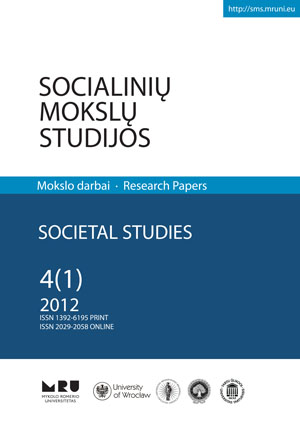Grūdų sandėlių veiklos licencijavimas kaip administracinis teisinis režimas
Grain Storage Licensing as Administrative Legal Regime
Author(s): Andrejus NovikovasSubject(s): Social Sciences
Published by: Mykolas Romeris University
Keywords: license; grain storage activities; legal regulations
Summary/Abstract: The article ‘Grain Storage Licensing as Administrative Legal Regime in The Agricultural Field’ consists of three parts. In the first part the author analyses the system of legal acts regulating licensing process of grain warehouse activities, reveals the compatibility of the legislation with the European Union legislation. In addition, in this section redundant and dubbing regulation of the Lithuanian laws governing licensing process of grain warehouses is identified. The second section describes the requirements for entities wishing to engage in licensed grain storage activities, specifies how entities are parties to engage in these activities and the gaps of legislation defining the status of such entities. In the third part the author gives the best practice examples of the foreign grain warehouse licensing that could be successfully applied in Lithuania. The author provides the following conclusions: 1. Secondary legal acts not only overlap with the main document – the Law of the Republic of Lithuania on Licensed Warehouses and Storage Documents – but also with each other. 2. Validity, suspension and revocation of licenses should be removed from The Grain Warehouse Licensing Rules as contrary to constitutional doctrine, thus preventing the conflict of laws and secondary legislation. 3. The Law provides that a licensed warehouse may be set up as an entity of the Republic of Lithuania, as an entity the European Union Member States. However, The Grain Warehouse Licensing Rules unduly narrow the range of subjects. Section II, Item 8 of these Rules states that only persons registered in the Republic of Lithuania must have the license. 4. According to the U.S. experience, an additional requirement should be introduced for a licensed warehouse operator pursuing activity, namely not to engage in bad business practices, and penalties for false business records. In addition, the U.S. legislation governing licensed grain warehouses provides for stricter requirements for grain warehouses, high level technical and financial requirements, compared to those in Lithuania. More stringent requirements provide depositors’ confidence that their goods will be protected, by ensuring the quality and quantity of the warehoused goods.
Journal: Socialinių mokslų studijos
- Issue Year: 4/2012
- Issue No: 1
- Page Range: 309-321
- Page Count: 13
- Language: Lithuanian

